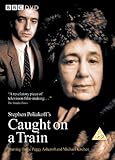Eye For Film >> Movies >> Caught On A Train (1980) Film Review
This is yet another release which will see you mourning the loss of programme-making of yore, when having something to say didn't mean you had to hang everything on a buzzword or news headline. It's all too easy to forget how little television time original drama is given these days in a sea of Shameless Footballers' Wives Go Back To Reality. Blessed then are the DVD owners who can pick up this engaging drama to watch instead.
Michael Kitchen plays a thrusting publishing executive - who remains nameless, but, according to writer Stephen Poliakoff, was called Peter - in 1980, just before the term "yuppie" began to be used to describe people like him. For reasons mostly unexplained, he chooses to travel on a trans-continental train from Ostend to Linz, which quickly turns in to the type of journey from hell that anyone who has ever inter-railed will find familiar.

Initially, the trip looks set to be fun, especially when attractive American, Lorraine (Wendy Raebeck), enters the carriage. His hopes of being alone, however, are quickly dashed by the arrival of an assortment of other travellers, including the overbearing Austrian, Frau Messner (Peggy Ashcroft). A battle of wills ensues between the elderly matron and Peter, during which they reach an awareness that they may not be so different from one another as they would first like to think.
The central plot concerns the clash of the two main characters and, by extension, the conflict between "old" and "new" Europe - a conflict which still endures today. Poliakoff's script also addresses issues of hooliganism and illegal migration, which are possibly even more relevant than they were when he first wrote it. Mention must also be made of Mike Westbrook's excellent jazz-based score, which adds beautifully to the overall effect of the screenplay.
A sense of tension, menace and claustrophobia is maintained throughout this enjoyable and thought-provoking drama, even when the action moves away from the train, and the quality of the acting is superb throughout. Ashcroft understates the Austrian accent beautifully, while Kitchen manages to say as much with a look as Poliakoff achieves with the script.
Rather than being hung up on one central event, like famous train movies, such as Murder On The Orient Express and The Lady Vanishes tend to do, this is an explorative, character-driven piece and none the worse for it.
Watch it, then write a letter to the BBC demanding more of the same.
Reviewed on: 25 Feb 2004


















